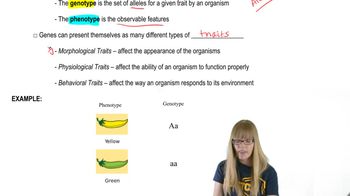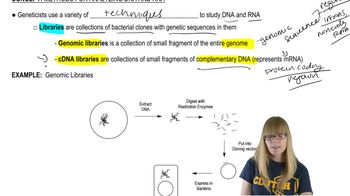Table of contents
- 1. Introduction to Genetics51m
- 2. Mendel's Laws of Inheritance3h 37m
- 3. Extensions to Mendelian Inheritance2h 41m
- 4. Genetic Mapping and Linkage2h 28m
- 5. Genetics of Bacteria and Viruses1h 21m
- 6. Chromosomal Variation1h 48m
- 7. DNA and Chromosome Structure56m
- 8. DNA Replication1h 10m
- 9. Mitosis and Meiosis1h 34m
- 10. Transcription1h 0m
- 11. Translation58m
- 12. Gene Regulation in Prokaryotes1h 19m
- 13. Gene Regulation in Eukaryotes44m
- 14. Genetic Control of Development44m
- 15. Genomes and Genomics1h 50m
- 16. Transposable Elements47m
- 17. Mutation, Repair, and Recombination1h 6m
- 18. Molecular Genetic Tools19m
- 19. Cancer Genetics29m
- 20. Quantitative Genetics1h 26m
- 21. Population Genetics50m
- 22. Evolutionary Genetics29m
18. Molecular Genetic Tools
Methods for Analyzing DNA
Problem 10c
Textbook Question
Does genetic analysis by ASO testing allow for detection of epigenetic changes that may contribute to a genetic disorder? Explain your answer.
 Verified step by step guidance
Verified step by step guidance1
<span>ASO (Allele-Specific Oligonucleotide) testing is a molecular technique used to detect specific known mutations in a gene. It involves the use of short DNA probes that hybridize to the target DNA sequence if the specific mutation is present.</span>
<span>Epigenetic changes refer to modifications on DNA or histones that affect gene expression without altering the DNA sequence itself. Common epigenetic changes include DNA methylation and histone modification.</span>
<span>ASO testing is designed to detect specific nucleotide changes in the DNA sequence, such as single nucleotide polymorphisms (SNPs) or small insertions/deletions. It does not detect changes that do not alter the DNA sequence, such as epigenetic modifications.</span>
<span>Therefore, ASO testing is not suitable for detecting epigenetic changes, as these changes do not involve alterations in the DNA sequence that ASO probes are designed to detect.</span>
<span>In summary, while ASO testing is effective for identifying specific genetic mutations, it cannot be used to detect epigenetic changes that may contribute to a genetic disorder.</span>
Recommended similar problem, with video answer:
 Verified Solution
Verified SolutionThis video solution was recommended by our tutors as helpful for the problem above
Video duration:
1mPlay a video:
Was this helpful?
Key Concepts
Here are the essential concepts you must grasp in order to answer the question correctly.
ASO Testing
Allele-Specific Oligonucleotide (ASO) testing is a molecular technique used to detect specific genetic mutations associated with diseases. It involves using short DNA sequences that are complementary to the target mutation, allowing for the identification of alleles in a sample. ASO testing is particularly useful for diagnosing single-gene disorders and can provide insights into the genetic basis of certain conditions.
Recommended video:
Guided course

Chi Square Analysis
Epigenetics
Epigenetics refers to the study of heritable changes in gene expression that do not involve alterations to the underlying DNA sequence. These changes can be influenced by environmental factors and can affect how genes are turned on or off. Epigenetic modifications, such as DNA methylation and histone modification, can play a significant role in the development of genetic disorders, potentially impacting disease phenotypes.
Recommended video:
Guided course

Chromatin
Genetic Disorders
Genetic disorders are diseases caused by abnormalities in an individual's DNA, which can result from mutations, chromosomal abnormalities, or epigenetic changes. These disorders can be inherited or arise de novo and can affect various bodily functions. Understanding the genetic and epigenetic factors involved in these disorders is crucial for diagnosis, treatment, and management strategies.
Recommended video:
Guided course

Descriptive Genetics

 7:40m
7:40mWatch next
Master Methods for Analyzing DNA and RNA with a bite sized video explanation from Kylia Goodner
Start learningRelated Videos
Related Practice


